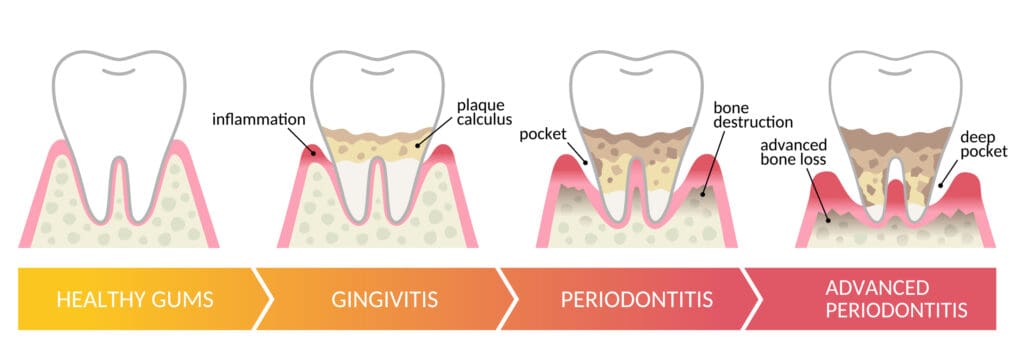An estimated 80% of Americans suffer from some form of periodontal or gum disease. Luckily, if the condition is caught early, it is extremely treatable and even reversible.
The team at Infinity Dental of Fox Lake can diagnose and treat gum disease in Fox Lake, IL. During each routine visit, Dr. Prendergast looks for the early warning signs of developing periodontal disease.
What is Gum Disease?
Periodontal disease is a dental health problem that affects the gum tissues and other supporting structures of the teeth. It occurs when plaque, a sticky film of bacteria, builds up on the teeth and hardens into tartar. Too much plaque and tartar on the teeth can lead to inflammation, redness, and bleeding of the gums.
When a person with this level of buildup dose not seek treatment, the oral disease will cause serious damage to the gums, bones, and teeth. Gum disease left undetected for a long time can potentially lead to tooth loss.

Stages of Gum Disease
Periodontal disease progresses through several stages if people do not receive the right treatment for it. Early detection is vital to stopping the progression. Diagnosing and treating gum disease in the early stages is why regular dental check-ups and good oral hygiene is so important.
Gingivitis
Gingivitis is the first stage of gum disease that is typically characterized by red, swollen irritated gums. This is the only stage that’s reversible. It is typically caused by bacteria in the plaque that builds up around your gums. If you’re bleeding or have sore gums due to gingivitis, a thorough cleaning to remove plaque can treat the condition.
Antibacterial washes may be recommended and consistent dental hygiene will prevent future buildup. These treatments are usually successful and will help avoid further infection and damage.
Early Periodontitis
When left untreated, gingivitis will eventually develop into periodontitis. This is a more advanced stage of gum disease and it can’t be reversed at this point. The bacteria in the plaque actually cause the gums to become infected which will result in damage to the soft tissue and bone that support your teeth.
Scaling and root planing are usually used at this stage. The pockets that have begun to form at the gumline will get thoroughly cleaned out. Your tooth roots are smoothed down so that the gums can reattach properly to the bone.
Moderate Periodontitis
Scaling and root planing are also the solutions for this more progressed form of periodontitis. More bacteria accumulate and begin attacking your bloodstream as well as your bone. The bacteria are able to get deeper into your body.
Severe Periodontitis
At this stage, the gum infection has completely evolved into a bacteria-causing disease. Your gums ooze pus, chewing is painful, and your teeth may be loose or falling out. At this point, the only treatment that can help is gum surgery.

What Are The Signs Of Gum Disease?
Some patients do not have obvious symptoms of gum disease and may not realize they have it until the later stages when damage to the gums affects the teeth or gums become significantly irritated. A tell-tale sign of gum disease is sore or bleeding gums.
Even with aggressive brushing, your teeth or gums should not bleed. If you have any of these common signs of gum disease, please contact Dr. Prendergast for an appointment:
- Bleeding, red, swollen, or sore gums
- Receding gums (teeth look longer)
- Shifting of teeth or tooth loss
- Mouth sores
- Constant bad breath
What causes gum disease?
Although there is no single factor contributing to gum disease, common causes include:
- Poor oral hygiene
- Smoking or tobacco use
- Genetic predisposition
- Hormonal changes, such as pregnancy or menopause
- Stress
- Certain medications
- Teeth grinding
- Poor nutrition
Treatment for Gum Disease in Fox Lake, IL
The recommended treatment for gum disease is dependent upon the stage and severity of disease as well as any other factors impacting your dental health.
Dr. Prendergast takes a comprehensive approach to the diagnosis and treatment of gum disease to ensure a stable and lasting result. From personalized oral hygiene recommendations to referrals to a specialist in advanced cases, treatment is designed to restore gum health and avoid the permanent effects of this progressive disease.
Scaling and Root Planing
Scaling and root planing is a treatment we offer to deep clean the gums. This procedure is necessary to improve the oral health of patients with gum disease. It involves a thorough cleaning to remove bacteria located under the gums and on teeth. There are several steps in this process:
- Scaling: The dentist will use special dental tools to remove plaque and tartar from the surfaces of your teeth, both above and below the gum line. This first step helps eliminate the bacteria causing gum disease.
- Root Planing: They then smooth out the roots of your teeth, removing any rough spots where bacteria can hide. This aims to help the gums reattach to the teeth, reducing gum pockets and promoting healing.
Restorative Treatments
Restorative dentistry plays a vital role in the treatment of gum disease. The restorative treatments we offer will address the damage caused by the infection. This essential component of comprehensive gum disease treatment will address damage caused by the disease and promote overall oral health. Restorative dentistry will ensure the long-term health and stability of the teeth and gums.
We will restore your teeth after addressing the disease with various treatments such as dental crowns, tooth fillings, or root canals. Such treatments will also prevent further damage to the teeth and avoid extractions. Restoring teeth will also support your gum health.
Gum Disease FAQs
To learn more about gum disease, please read through the answers to the most common questions we receive about this disease. This information can help you make better decisions about your dental health.
Can gums recover from gum disease?
Gums do not recover from gum disease. Once your gums are damaged by periodontal disease they will not reform or grow back. Treating gum disease can prevent the issue from getting worse, but it will not help gums recover or heal any past damage.
Can salt water rinse heal gum infection?
Salt water rinses are commonly used to heal gum infection. Salt water rinse has been shown to be an effective way to soothe inflamed gums from gum disease. The combination of salt and warm water draws infection out of the gums.
Will I lose my teeth if I have periodontal disease?
Some patients with periodontal disease may end up losing some teeth. Periodontal disease is serious and can cause damage to soft tissue that may result in destruction of the bone supporting one’s teeth. This may cause teeth to become loose or fall out.
Can I reverse gingivitis?
Yes, you can reverse gingivitis by being more proactive with your oral hygiene routine. If your gums bleed when you brush, begin flossing before brushing. Then, gently brush your teeth and gums with non-abrasive toothpaste and a soft-bristled toothbrush. Over time, you should see a difference in your gum health.
Is gum disease contagious?
No, gum disease is not contagious. You cannot spread gum disease to another person.
Do I need to visit the dentist more often if I have gum disease?
We may recommend visiting our office for more frequent and thorough dental cleanings if you have gum disease. These preventative cleanings keep your oral health in check as decay-causing bacteria can re-emerge in patients with chronic gum disease. We will provide a dental cleaning schedule for you to ensure that you can comfortably live with chronic gum disease.
Schedule a Dental Exam & Periodontal Consultation
If you are experiencing any of the symptoms of gum disease or have not had a regular checkup in the past 6 months, make an appointment with one of the dentists at Infinity Dental of Fox Lake today. It is extremely important to catch gum disease early in order to prevent extensive treatment.
